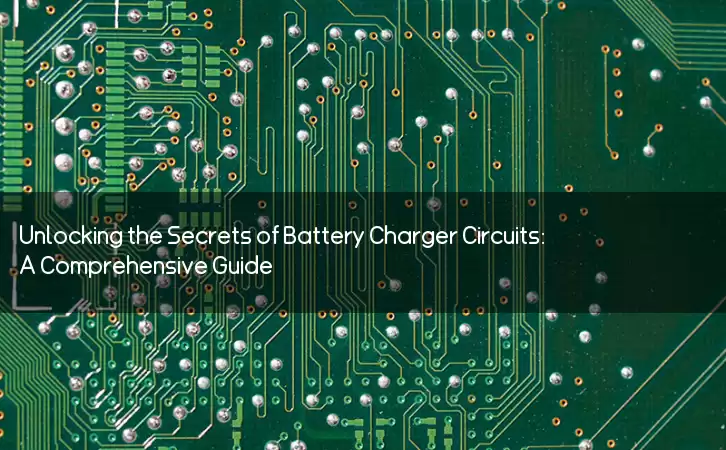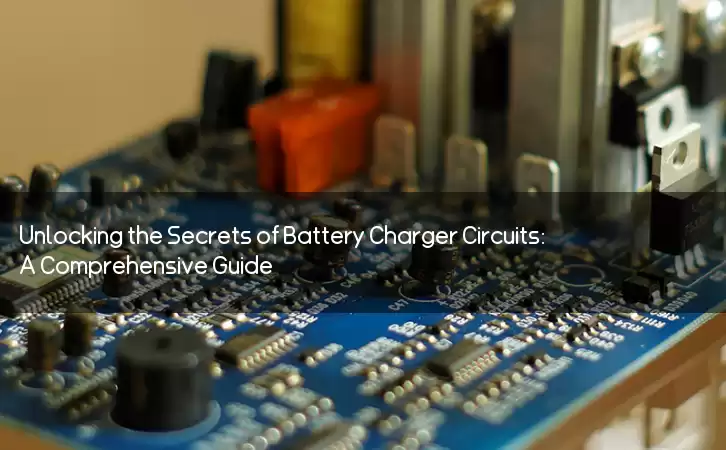Information Center
Unlocking the Secrets of Battery Charger Circuits: A Comprehensive Guide
Published:2023-08-14 20:33:38 Author:Green WCND Views:88Battery Charger Circuit: An Overview

A battery charger circuit is an electronic circuit that is designed to charge rechargeable batteries. The circuit includes a number of components that work together to control the charging process and ensure that the battery is charged safely and efficiently.

The basic components of a battery charger circuit typically include a voltage regulator, a charging indicator, and a charge termination circuit. The voltage regulator is responsible for regulating the voltage of the charging current and ensuring that the battery is charged at the correct voltage level. The charging indicator indicates the status of the charging process, while the charge termination circuit is responsible for ending the charging process once the battery is fully charged.
There are several types of battery charger circuits, including constant current, constant voltage, and pulsed charging circuits. Constant current charger circuits deliver a constant current to the battery during the charging process. Constant voltage charger circuits deliver a constant voltage to the battery during the charging process, while pulsed charging circuits alternate between a charging current and a rest period during the charging process.
The charging process for rechargeable batteries typically involves three stages: bulk charging, absorption charging, and float charging. During the bulk charging phase, the charger delivers a high charging current to the battery to quickly charge it up to a certain point. During the absorption charging phase, the charger reduces the charging current to avoid overcharging the battery, while still delivering enough current to maintain the battery’s charge level. During the float charging phase, the charger delivers a low charging current to maintain the battery’s charge level and prevent overcharging.
Battery charger circuits can be designed for a wide range of battery chemistries and voltages. Some common battery chemistries include lead acid, nickel-cadmium (NiCad), nickel-metal hydride (NiMH), and lithium-ion (Li-ion). The voltage of the battery will also affect the design of the charger circuit.
In addition to the basic components, modern battery charger circuits may include additional features such as safety protections, temperature monitoring, and USB charging capabilities. Safety protections may include overcurrent protection, overvoltage protection, and short-circuit protection. Temperature monitoring allows the charger to adjust the charging current based on the temperature of the battery, which can help prevent damage to the battery. USB charging capabilities allow the charger to charge mobile devices such as smartphones and tablets.
Battery charger circuits are used in a wide range of applications, including automotive, marine, and solar power systems. They are also used in consumer electronics such as laptops, smartphones, and portable gaming devices. As the demand for rechargeable batteries continues to grow, the development of new and improved battery charger circuits will play a crucial role in ensuring that these batteries are charged safely and efficiently.
Power Adapter Design and Customization Guide for Portable Electric KettlesI. Common Design Types for Portable Electric Kettle Power AdaptersPortable electric ke···
I. Common Design Types of Power Adapters External Independent Type (Most Common) Design: A standalone adapter (e.g., "black brick") connected to the p···
Handheld Vacuum Cleaner Power Adapter Selection GuideIntroductionHandheld vacuum cleaners have become a mainstream tool for household cleaning due to their port···
Drill Power Adapter Selection Guide.drill-container { font-family: Arial, sans-serif; line-height: 1.6; max-width: 800px; margin: 0 auto; padding: 20px; } .dril···





